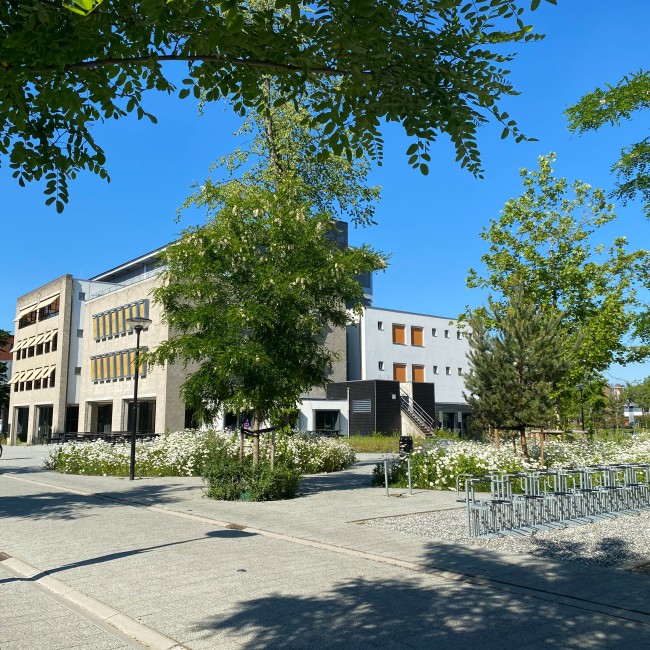Come and meet us
Walking around on campus is the best way to truly experience BUas. Sign up for one of the upcoming events or activities.
Why this study programme at BUas?
- An international, industry-experienced lecturing team
- Responding to the market’s demand for supply chain leaders of the future
- Close industry connections to close the gap between academic reality and professional practice
Study overview
Course content
During the master’s programme you will gain specialist and strategic supply chain knowledge and gain insight into the latest developments. You develop analytical skills in business intelligence and research as well as social skills in leadership, change and innovation. You learn to translate supply chain concepts into usable solutions, which you can apply in practice.
The duration of the master’s programme is 12 months and it consists of two semesters. The goal of the first semester is to deepen your knowledge by attending masterclasses, and exchange views with fellow students. At the end of the first semester you will have found an organisation where you will do your graduation project and submit a thesis topic for approval. , you will take the Supply Chain Modelling module and also start the graduation process, first you perform a business analysis, then you design a research proposal. After that, you start your graduation phase in the form of your master’s thesis. A full overview of the curriculum, course content and learning outcomes can be found in the study guide.
- Semester 1: Theoretical basis and an approved thesis topic
In the first semester you will attend six modules:
- Leadership
- Research Methods
- Business Intelligence
- Supply Chain Strategy
- Supply Chain & Research Fundamentals
- Change & Innovation
These modules are delivered in the form of masterclasses. Training courses and a business game are also included and are part of the modules Supply Chain & Research Fundamentals, Leadership, and Business Intelligence. The modules all contribute to laying a theoretical basis. At the end of the semester, you will be assessed by sitting examinations and submitting assignments and papers.
While these knowledge and skills are formed, you will be asked to find a suitable graduation host company including an approved thesis topic that matches your preferences. Your study timetable is divided in a way that you are allowed enough time for networking and searching for an organisation where you can do your graduation project or assignment. A mentor will guide you in this.
- Semester 2: Integrated Supply Chain Cases and a graduation project
In the second semester you will learn to integrate the different disciplines from the first semester and apply these to practice. You will start with the Integrated Supply Chain Cases module. In this module you will learn to apply the various disciplines from the first semester and quantitative modelling skills in different supply chain cases. At the beginning of the second semester, you will start conducting preparatory supply chain research with your graduation host company and deliver a research plan (for the module Research Proposal). The thesis period will start in week nine.
During the thesis period you will be challenged to analyse a supply chain at strategic level, deliver a supply chain improvement proposal and implementation approach, and develop and demonstrate your leadership skills in collaboration with the graduation company’s stakeholders.
Teaching method
Curriculum
Our curriculum is designed in a way that the students are offered the perfect balance between developing social and analytical knowledge and skills. By attending various masterclasses, you will develop into a strategic professional in supply chain management. During your studies, you will work on challenging supply chain cases requiring an interdisciplinary approach. You will build a strong foundation at the operational and tactical level in business management, logistics, and operations , and develop into a supply chain leader and specialist who can act as a professional at the strategic level. The core of the programme consists of specialist supply chain modules transforming you step by stepinto a specialist and eventually to a future leader in the supply chain industry.
Assessment
You will conclude each module, in most cases, with an interim examination or a paper. Marks cannot be compensated. This means that you will have to complete all modules with at least a 5.5. You will do your graduation project individually. You will write a research proposal and convert it into an academic thesis.
Learning communities
During the whole Master Supply Chain Management, you will be part of learning communities. In these communities, students, lecturers and professionals from the industry learn from each other, and real cases and practical projects are discussed. In doing so, you will develop your analytical, problem-solving and leadership skills.
Study load and coaching
This master’s programme consists of two semesters. In the first semester, you will spend a lot of time at BUas. In the second semester, you will work on your research proposal and thesis independently. Just take it for granted that you will be engaged in studying full-time. From day one, you will be assigned a mentor, who will guide you in your search for a suitable thesis topic. A graduation supervisor from BUas will guide you during your graduation project.
- A typical week
In the first semester, you will spend four days on the BUas campus for education.
Specimen week (the study timetable may vary from week to week):
Monday:
- 09.00-13.00 hrs: Independent study
- 13.00-15.00 hrs: Masterclass on Leadership
- 15.00-17.00 hrs: Masterclass on Research Methods
Tuesday:
- 09.00-11.00 hrs: Learning Community (at BUas or online)
- 11.00-13.00 hrs: Masterclass on Supply Chain Strategy
- 13.00-17.00 hrs: Independent study
Wednesday:
- 9.00-17.00 hrs: Combination of independent study, searching for a thesis topic, events (training or guest lecture)
Thursday:
- 09.00-11.00 hrs: Q&A Research Methods
- 11.00-12.00 hrs: Q&A Leadership
- 12.00-13.00 hrs: Q&A Business Intelligence
- 13.00-14.00 hrs: Q&A Supply Chain Strategy
- 14.00-15.00 hrs: Q&A Change & Innovation
- 15.00-17.00 hrs: Independent study
Friday:
- 09.00–10.00 hrs: Independent study
- 10.00–12.00 hrs: Masterclass on Business Intelligence
- 12.00-13.00 hrs: Independent study
- 13.00-15.00 hrs: Masterclass on Change & Innovation
- 15.00-17.00 hrs: Independent study
Student well-being
BUas encourages and helps you to make the most of yourself, whatever your circumstances. Maybe you have a chronic illness, are a family carer, a competitive athlete, or juggle your studies with running your own business? Our study coaches, student counsellors and student psychologists are here to help. Do you need extra support or advice? Or extra facilities? Then take a look at the options here.
Professional versus academic master’s degree
The level of education in both forms is the same. Both the professional master's and the academic master's degrees are hard work and the number of ECTS credits is the same. Yet there are some differences.
The biggest difference lies in the nature of research undertaken. A professional master's degree focuses mainly on practical application within the professional realm. In contrast, an academic master’s degree emphasises the cultivation of research skills, theory and knowledge development. So, are you more practice-oriented? Then a professional master’s would be a prudent choice. Conversely, if theoretical exploration appeals to you, an academic master’s would likely suit you better.
What makes this study programme unique?

Leadership skills
The future supply chain manager cannot manage without the required leadership skills! This master’s degree offers you the perfect combination between developing the right analytical skills as well as the right social skills in leadership, change and innovation.

From theory to practice
In learning communities the students get the opportunity to interact with industry professionals, enhancing their professionalism and ability to reconcile theory and practice.
Admission & application
What are the admission requirements?
With a BSc Logistics or a bachelor's degree with a major or a minor in logistics you can be admitted to the programme Master Supply Chain Management. If you do not meet these requirements, you can have a look at the options available to you.
Information about admission requirements
What does this study programme cost?
For academic year 2025-2026 the tuition fee is €2,601 per year. In addition, you should take extra costs for software, excursions, etc. into account.
How can I apply?
If you meet the admission requirements, you can apply for this study programme. You can apply until 15 August, but you are encouraged to apply before 1 July because of the summer holidays. This is a selection programme, meaning that only 40 students are admitted each academic year.
Find out if this study programme suits you
Within five minutes you will find out if our small-scale study environment is the right fit for you!


Translating knowledge into real-world applications

Tomorrow’s supply chain leaders

They form a community

What can you do after your studies?
The supply chain manager of the future is competent in a wide range of disciplines. Future supply chain leaders have specialist knowledge of the entire supply chain and understanding of the latest developments.
With a master's degree in Supply Chain Management under your belt, the possibilities are numerous! You will often start in positions such as supply chain engineer, planner or consultant, but soon, you can progress to a more managerial position. After your graduation you will hold a Master of Science degree.

Virtual campus tour
Have a virtual look and discover the Frontier building where you’ll be studying and what more the campus has to offer.

Get inspired!
Get inspired by the BUas learning community projects, white papers and the latest news in the field of logistics.

Help with choosing your study programme
Do you want to continue after your bachelor's or further develop your professional skills and are you looking for a master's? Discover, compare and choose your master's programme at BUas.



